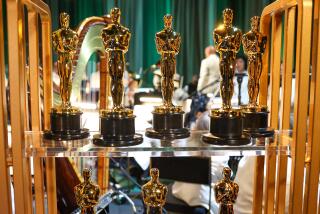Book review: ‘Everyone’s a Winner’
- Share via
We’re living in an age of prize proliferation. It might not feel like it — especially with so many families hit hard by economic turmoil in the last few years — but it still exists, according to Joel Best’s “Everyone’s a Winner,” a book that looks at the ways and the reasons why our society puts so much emphasis on a pat on the back.
Everyone knows that the gentleman’s C of years ago has become the B-plus or A-minus of today. Averages higher than 4.0 are commonplace in high schools and, at graduation time, many schools crown not one but multiple valedictorians. A couple of years ago, more than 60% of the graduating class at Harvard received honors.
Affluence inflation has seeped well beyond the classroom. The military, Best writes, is doling out medals much more freely and for activities that were never before thought to be particularly superlative. There has also been a quantum leap in literary awards, as well as Oscars, Grammys, Halls-of-Fame — you name it and there is a prize for it.
Although we may now give out medals just for trying, Best points out that life in America is rough and tumble. Performance is all-important, and it is hard to perform well when you feel like a loser. Ego protection and enhancement have been partly the engine behind “status inflation,” which first got rolling with grade inflation.
An author who has written widely on the hoodwinking uses of statistics, Best observes that awards do not only benefit the individual whom they are bestowed upon but also serve to validate the groups that offer them. In addition, he is aware that “some status allocation is manipulative. When a fast-food franchise names an ‘Employee-of-the-Month,’ this can be dismissed as a fairly obvious effort by management to motivate workers without actually paying them more.”
Nicely leavened with quotes from the likes of Stephen Colbert and Garrison Keillor, “Everyone’s a Winner” contains an insightful chapter on the rapidly expanding criterion for what today counts as a hero. “Heroes,” Best writes, “are no longer viewed simply as distant figures performing great deeds. The label is now applied to all sorts of people whose behavior is admired.”
The author’s thesis that we have become a congratulatory culture harmonizes with conservative thinking that all the ersatz awards and worries about Johnny’s self image are molding Johnny into a narcissistic incompetent with an inflated feeling of self worth. However, Best is careful to emphasize that prizes often lead to life-changing opportunities and that the economically privileged have two legs up in the struggle for recognition.
In the end, Best does not exactly swipe all of the plaques off of the mantelpiece, nor is it clear what side he comes down on in the debate between traditionalists and those who believe all Little League participants should have medals put around their necks. Still, in this age of incessant spin, it is refreshing to have the facts calmly laid out, and the reader left to decide, in this case, whether society’s grading curve needs recalibration.
Marino is a frequent contributor to the Wall Street Journal and is the editor, most recently, of “Ethics: The Essential Writings.”
More to Read
Sign up for our Book Club newsletter
Get the latest news, events and more from the Los Angeles Times Book Club, and help us get L.A. reading and talking.
You may occasionally receive promotional content from the Los Angeles Times.








